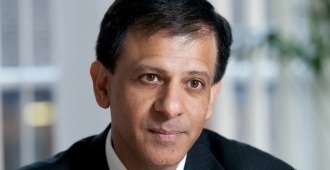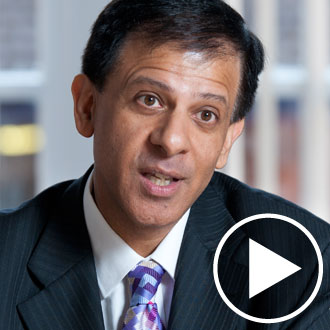
Next year’s GP contract consists of minimal changes compared with recent years.
But the real question on many GPs’ minds is why little has been done to relieve the unprecedented pressure the profession is currently under.
When we put the question to him, the GPC chair agrees with a polite smile that the contract ‘may not have changed much’.
But Dr Chaand Nagpaul adds, more sternly, that there is ‘no way’ that contract changes alone could address GP pressures which go ‘well beyond the contract’.
‘This may not change the overall pressure on GPs, but what is not in the contract I think should be recognised as much as what is.’ He says it has made a parallel deal with the Government that there will be further negotiations to find short and long-term solutions to the problems, including the workforce crisis and the dismal state of practice premises.
‘Of course these contract changes cannot address all of that, which is why we agreed that we wanted small changes to the contract so that we could focus on those bigger issues.
‘In parallel to our contract negotiations we have been having dialogue both with the Department of Health and NHS England on other, wider measures that need to take place for general practice to be supported in the coming months.’
The 2015/16 contract did have some new elements: requiring practices to publish their average earnings, give every patient a named GP and giving patients access to all coded information in their GP record. But the lack of major QOF changes, the increased funding for maternity and paternity cover and some reduction in the paperwork of the unplanned admissions DES are all welcome additions.
In fact if stability was what the GPC was after, this deal appears the best one for a long time.
As GPC chair Dr Chaand Nagpaul is quick to point out when Pulse meets him a week after the new agreement is announced the patient participation DES and the alcohol DES have both been removed.
‘What we have actually is a contract where we have got rid of two DESs, reversed those and put them into core funding,’ he says.
‘This is not something that governments like to do, to take away monitoring and just put it into core funding. We have also stemmed, perhaps, the extent of which the Government wanted patients to have online access to records,’ he adds.
Further, getting the Government to agree to only making small changes ‘in a pre-election year’ was not easy, Dr Nagpaul stresses, saying that the success of the negotiations be judged not just on what is in the contract, but also on what is not.
He says: ‘What is also important to recognise is that in a pre-election year there was a huge amount that the Government wanted to add to the contract, and we managed to push back on most of that.’
Quickfire Q&A:
Have you agreed to publishing individual GP earnings?
No. The furthest we have got are the arrangements in place for next year. I hope that this will put pace to rest a lot of the myths around what GPs earn.
Why not shrink QOF further?
In negotiations it isn’t just what we want, it is also what the Government wants so I what we agreed was for stability whilst we assess the rightful place for QOF in the bigger scheme of things.
Why scrap the patient participation DES?
It has been a nightmare for many practices. In parts of London three quarters of practices didn’t get paid because of technicalities. So actually we responded to what GPs wanted, they wanted to strip out the whole bureaucracy of producing reports.
And the alcohol DES?
Again most practices incur unnecessary work in claiming for payments and that whole process of monitoring has now gone. GPs are now relieved of that bureaucracy, do not have to claim, and just receive payment for clinically appropriate care.
As for what the Government wanted to add, Dr Nagpaul insists this is confidential, but he adds: ‘I can assure you that there is no way that this contract that we got reflects the wish of the Government. We negotiated very hard to make sure that we did not agree to elements that would have added further workload, and more misery, for GPs.
‘The fact that we are here today with a contract with hours of availability that have not changed I think speaks for itself. I am not responsible for out of hours, those arrangements have not changed.
‘We know the Government has a strong agenda for access – none of that is in the contract. We have actually managed to stem many elements of what the Government would have liked.’
He further reveals that, unsurprisingly, the Government pushed for inclusion of the NICE menu of new QOF indicators – including a controversial bundled indicator for diabetes.
So what gave the GPC the leverage to deny the Government this long list of demands?
‘I was very straight with the Government. I asked them to open their eyes and look at the facts in front of them,’ explains Dr Nagpaul.
‘We have a situation where the Government’s own commissioned studies are talking about a workforce crisis. We have seen a 15% drop in young graduates choosing general practice as a career. We are seeing practices closing, younger doctors emigrating, leaving.
‘All I did was tell the Government: “look at this picture in front of you, and you have a choice of action – of making this worse and seeing the whole of general practice collapse, or you have a choice to stand back and limit changes to the contract, get rid of some of the headaches for GPs”,’ he adds.
‘The argument that I make to the Government is… that if it fails to invest in general practice today this is going to have huge repercussions on the rest of the system.’
Although the Government’s track record for keeping promises to support GPs isn’t the best, Dr Nagpaul believes that the current state of affairs means that this time, the Government will be forced to act.
He says: ‘The Government, I think, doesn’t have a choice. It is not a case of me saying “please resource general practice”… it is about them understanding that investing in general practice is the only way to stem the huge [cost] pressures facing the NHS.’
Dr Chaand Nagpaul’s CV
Age 53
Family Married (to a GP), with two children (aged 14 and 16)
Education Medical school at St Bartholomew’s Hospital London from 1979-85 and did his GP training scheme at Charing Cross hospital 1986-89
Career
1989-present: GP partner in Stanmore in northwest London (became a partner the day after qualifying as a GP)
1990 – joined Harrow LMC
1996-present: Elected onto GPC (has sat on 11 BMA subcommittees and chaired two)
1996-2007: RCGP Council member
2007-present: GPC negotiator
2008-present: BMA Council member
2013-present: GPC chair
Interests I love music, the perfect antidote to a stressful day, especially if at full volume, much to the annoyance of the rest of the family. I have an extensive music collection mainly of jazz, and still try and catch a live concert when I can. I recently bought a saxophone, having regretted not learning a musical instrument as a child, with the added challenge of learning to read music at this late stage. I’m also a passionate Londoner – the greatest capital in the globe – I love spending weekends going for walks and hanging out in this magnificent metropolis.
Pulse October survey
Take our July 2025 survey to potentially win £1.000 worth of tokens














